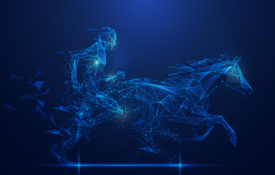-

New Research in Psychological Science
A sample of research on note-taking, visual processing speed in older adults, logical reasoning in monkeys, narcissism in children, counterfactual curiosity, how narratives can shape attitudes toward immigration, motion perception, and using a distanced diary to train for wisdom.
-

Horse Brain and the Human Brain
APS’s Charles Blue talks with APS Founding Member Dr. Janet Jones, author of the book Horse Brain, Human Brain.
-
How Can We Protect Ourselves Against Manipulation, Fake News, and Other Digital Challenges?
In contrast to the offline world, the online world is largely driven by the logic of the attention economy: Users’ attention is a precious currency, and online environments are designed to capture and steer that attention. Yet users and legislators currently have little say in how these environments are regulated and controlled; instead, this responsibility is mostly left in the hands of corporations. How can users respond to these challenges of the digital age and how might the design of the online world be improved?
-
Why Your Brain Feels Broken
... It turns out that many aspects of our pandemic lives could lead to impaired executive functioning, which is a fancy way of describing the mental processes that allow us to plan, organize and remember instructions. “A lot of things need to function well for our memory to work ideally,” said Marie Eckerström, a neuropsychologist at the Sahlgrenska Memory Clinic in Gothenburg, Sweden, who studies cognitive impairment. “Managing too many details can definitely make you feel ‘foggy,’ and make you feel like your memory has declined,” she said.
-
The Collective Grief We Must Face
APS Member/Author: Dorothy P. Holinger I have known grief all my life. My baby sister died when I was a toddler, and I know what it did to my family. We couldn’t grieve her death properly because the family ethos was not to talk about our losses. Now, as a clinician, I treat bereaved patients. And I also wrote a book that describes what happens to the human self after the death of a loved one. I’ve become an expert on grief. Yet I was unprepared for the challenges that COVID-19 and its massive death toll brought us as a nation. Death is different now. COVID patients die alone, without family. Funeral services are virtual; we can’t hold each other to grieve and cry.
-
How the Pandemic is Changing Children’s Friendships
Just one year ago, kids could hold their friends’ hands. They shared blankets at sleepovers. They clustered around birthday cakes to help blow out the candles. And now they don’t. Many things in our pandemic-stricken world are very different. But perhaps the most striking change is how kids’ interactions with each other have transformed. Learning to socialise in the era of social distancing can be tougher than any subject offered in virtual school, and experts like Wellesley College psychology professor Tracy Gleason believe that if children’s friendships are altered, that could have an effect on them both now and in the future.

